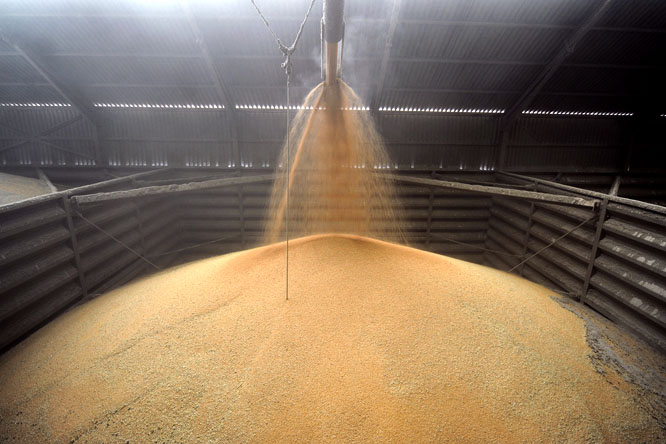The cheap influx of Ukrainian grain has caused quite a lot of confusion in the region, the price-depressing effect of which is causing a significant loss of income for grain growers. While the situation seems to be escalating on the grain front as well, Brussels does not seem to care, the member countries concerned have thus taken joint and individual measures against Ukrainian imports. The case already has a "chief victim": Henryk Kowalczyk recently resigned as head of the Polish Ministry of Agriculture and Rural Development.
Photo: Ritzau Scanpix via AFP/Ritzau Scanpix/Bo Amstrup
According to data from the European Commission, the value of grain imports to the European Union from Ukraine increased to 12.2 billion euros - that is, almost twice as much - from 6.9 billion euros in the previous year. The reason for this was obviously that last June
the agreement on the duty-free entry of all products from Ukraine entered into force.By the way, in 2021, Ukraine was the world's sixth largest exporter of wheat according to FAO data - after the EU, Russia, the United States, Australia and Canada - and the third largest exporter of corn, after the United States and Argentina - and accounted for about half of world exports of sunflower oil .
According to European Commission figures based on Ukrainian customs data, total Ukrainian wheat exports increased from 11.2 million tons in 2021 to 20 million tons in 2022, and Ukrainian barley exports increased from 2.1 million tons to 5.7 million tons. Ukraine's corn exports in 2022 were 24.7 million tons, compared to 25.2 million tons the previous year. From August 2022 to March 2023, a total of 25.6 million tons of grain were exported through the Black Sea transport corridor, half of which was corn and almost a third was wheat. At the same time, Ukraine exported 29 million tons of grain until March 2023 from May of the previous year.
According to Eurostat data, in 2022, Romania imported 500,000 tons of wheat and almost 800,000 tons of corn from Ukraine, while Poland also imported 500,000 tons of wheat and 1.8 million tons of corn. Hungary imported almost 200,000 tons of wheat from Ukraine and about 1 million tons of corn last year.
Also based on Ukrainian customs data, the Directorate-General for Agriculture and Rural Development of the European Commission calculates that
Ukraine exported an additional 5 million tons of grain to the EU in the first three months of this year through the European solidarity corridors.Ukrainian imported goods were only available on the Hungarian market at an average price of 65-70 euros per ton lower, so it is no wonder that they broke down grain prices to around HUF 100,000.
Brussels has decided not to provide all Eastern European member states with mitigation support to offset the disruption caused by the price-depressing effect of Ukrainian grain flooding the EU market, even though six countries have requested it, but only the Poles, the Romanians, and a total of 56 million euros and distributed among the Bulgarians. Agriculture Minister István Nagy said: our country has asked the Commission to review its position.
Don't get me wrong: the countries that were awarded the above 56 million in damage mitigation also requested additional measures! In comparison, the European Commission is doing nothing but extending duty-free grain imports from Ukraine by one year from June. This was really a lot for the farmers in the area, who were not in a very rosy mood anyway due to the low grain prices, and who had previously expressed their disapproval of the situation. In Poland and Romania, farmers have already protested at demonstrations due to the duty-free, i.e. discounted, flow of Ukrainian grain into the European Union - including to them. Poland, Hungary and Romania have already taken action in the matter "within their own jurisdiction".
Prior to this, Poland stepped up controls after the arrival of substandard goods, particularly corn contaminated with mycotoxins. And the Minister of Agriculture, István Nagy, announced that: Hungary will introduce new measures and will even more strictly control the Ukrainian grain coming from Ukraine through the solidarity corridor, so that it can actually reach the original destination countries. The minister initiated the introduction of the Electronic Road Goods Traffic Control System (EKÁER) for the main grain and oilseed crops as well. In Romania, the ruling Social Democratic Party (PSD) in Bucharest initiated the temporary suspension of Ukrainian grain exports to the country.
Source and full article: Magyar Hírlap
Featured Image: AFP/Illustration












